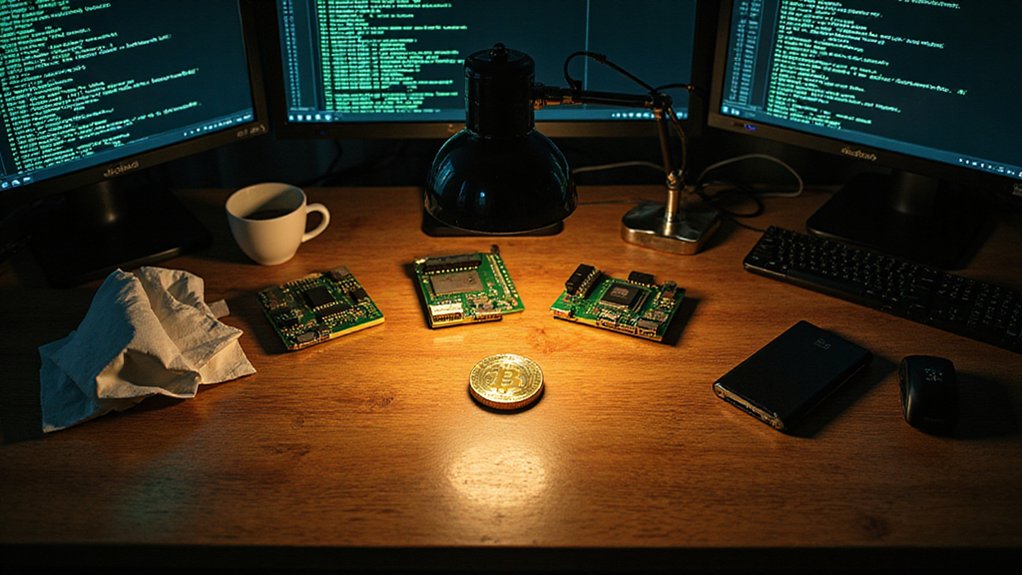Blockchain applications are revolutionizing industries with remarkable speed, as 55% of healthcare systems integrate cryptographic ledgers by 2025 (a stunning reversal for an industry that clung to fax machines), while financial services—holding 20% market share—face inevitable disruption within five years. Over 80% of Fortune 500 companies deploy blockchain for supply chain transparency, and gaming sectors create new economic models through digital asset ownership. The global market’s projected $306 billion trajectory suggests deeper transformations await exploration.

The blockchain revolution—that once-niche cryptographic curiosity birthed from Bitcoin’s rebellious origins—has evolved far beyond its libertarian origins to infiltrate the most traditional bastions of commerce with the persistence of water finding cracks in concrete.
Today’s blockchain landscape boasts a staggering $200 billion locked in DeFi protocols while simultaneously promising to digitize everything from your grandmother’s medical records to your nephew’s virtual sword collection.
Healthcare leads this metamorphosis with remarkable audacity, as 55% of healthcare applications are expected to integrate blockchain by 2025.
Healthcare’s bold embrace of blockchain technology represents a stunning reversal for an industry historically allergic to digital innovation.
The irony is palpable: an industry notorious for clinging to fax machines and paper charts now embraces cryptographic ledgers for patient data management.
Meanwhile, the financial sector—unsurprisingly—claims the largest market share at 20%, with 77% of global executives acknowledging blockchain’s inevitable disruption of their industries within five years.
Supply chain management presents perhaps the most pragmatic application, with over 80% of Fortune 500 companies deploying blockchain for operational transparency.
The technology’s ability to track products from origin to consumer provides an immutable audit trail that would make even the most skeptical CFO grudgingly appreciative.
Infrastructure solutions dominate this space, comprising 40% of the market as companies prioritize data security across complex logistics networks.
Gaming and real estate sectors offer more speculative implementations, though both demonstrate blockchain’s versatility.
Digital asset ownership in gaming creates new economic models (however dubious their long-term viability), while real estate transactions benefit from enhanced transparency and automated processes that reduce traditional friction points. The gaming NFT market exemplifies this transformation, with layer 2 scaling solutions enabling faster and more secure transactions while introducing decentralized governance models that empower player participation. Advanced blockchain integration with IoT and AI is particularly transforming telecommunications by enhancing cybersecurity protocols and operational efficiency across network infrastructures.
The numbers supporting this expansion are equally impressive and bewildering.
The global blockchain market projects growth to either $306 billion or over $1 trillion by decade’s end—a variance that speaks volumes about forecasting precision in emerging technologies. The underlying blockchain infrastructure functions as a distributed network across many computers, eliminating any single point of control or manipulation that could compromise system integrity.
With a compound annual growth rate of 58.3% globally and Asia Pacific leading at 61.8%, the technology’s momentum appears unstoppable.
Hybrid blockchain solutions currently capture 42% of the market, suggesting enterprises prefer controlled implementations over fully decentralized alternatives.
This measured approach reflects institutional caution while acknowledging blockchain’s transformative potential across industries previously considered immune to cryptographic innovation.
Frequently Asked Questions
What Are the Main Technical Challenges When Implementing Blockchain in Existing Systems?
Organizations face scalability bottlenecks with traditional blockchains processing mere thousands of transactions per second—hardly impressive for enterprise demands.
Interoperability presents another headache, as disparate blockchain protocols refuse to communicate seamlessly with legacy systems (which, predictably, weren’t designed for decentralized architectures).
Security vulnerabilities compound these issues, while smart contract bugs create exploitable weaknesses.
The integration complexity often overwhelms existing IT infrastructure, requiring substantial architectural overhauls that executives rarely anticipate.
How Much Does It Typically Cost to Develop a Blockchain Solution?
Blockchain development costs span a characteristically wide range—from $10,000 for basic applications to $300,000+ for enterprise solutions that presumably justify such expenditure.
Most projects fall within the $10,000-$50,000 sweet spot, with hourly rates hovering between $25-$49.
Factor in security audits ($5,000-$50,000+), ongoing maintenance (15-20% annually), and monthly infrastructure costs ($5,000+), and one begins appreciating why blockchain budgets often exceed initial estimates with remarkable consistency.
What Regulatory Compliance Issues Should Companies Consider Before Adopting Blockchain?
Companies must navigate a regulatory labyrinth spanning AML/CFT requirements under FinCEN oversight, data privacy compliance (particularly GDPR’s “right to be forgotten” versus blockchain’s immutability), and multi-jurisdictional licensing across states and countries.
The patchwork of federal, state, and international frameworks demands proactive regulatory engagement—because discovering compliance gaps post-deployment makes root canal procedures seem pleasant by comparison.
RegTech integration and specialized legal counsel become essential investments, not optional luxuries.
How Long Does Blockchain Implementation Usually Take for Medium-Sized Businesses?
Medium-sized businesses typically require 6-24 months for complete blockchain implementation, though this timeline often stretches beyond initial projections.
The process encompasses planning (1-4 months), pilot development (2-6 months), and full deployment with existing system integration (3-12 months).
Internal readiness—frequently underestimated—demands 3-6 months for organizational skill development.
Implementation costs range from $50,000-$200,000, with timelines extending when companies discover their internal expertise gaps exceed expectations.
What Skills Should Employees Have to Work With Blockchain Technology?
Employees require proficiency in core programming languages (Python, JavaScript, C++), cryptographic principles, and smart contract development frameworks like Truffle or Hardhat.
Beyond technical competencies, they need database management skills encompassing both SQL and blockchain-specific storage solutions like IPFS.
Mathematical aptitude in algebra and statistics proves essential—though one might wonder why basic numeracy has become a specialized requirement.
Version control systems, security vulnerability assessment, and collaborative development methodologies round out the necessary skill set.









